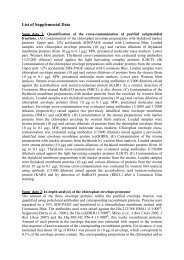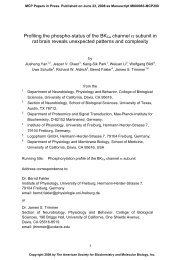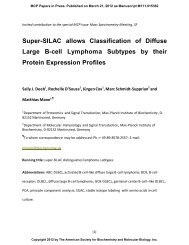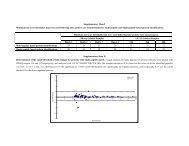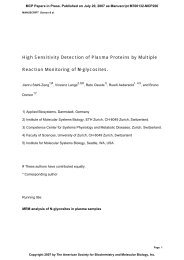MSDaPl - Molecular & Cellular Proteomics
MSDaPl - Molecular & Cellular Proteomics
MSDaPl - Molecular & Cellular Proteomics
You also want an ePaper? Increase the reach of your titles
YUMPU automatically turns print PDFs into web optimized ePapers that Google loves.
• Files are often spread across file systems, hard drives, and tape backups in an ad hoc<br />
manner, making them hard to locate.<br />
• Files may be poorly annotated with regards to experimental conditions, software<br />
parameters, or even the software used to generate the data.<br />
• File formats become obsolete and eventually unsupported by current tools.<br />
• Visualization tools and analysis software must be installed and maintained to view or<br />
interrogate the data files.<br />
Government and journal rules regarding public data dissemination have led to the<br />
development of online proteomics data repositories such as PRIDE(11), Peptide Atlas(12),<br />
Global Proteome Machine (GPM)(13), Human Proteinpedia(14), and the YRC PDR(15)--all of<br />
which provide unified web-based interfaces to underlying proteomics data stored in relational<br />
databases. Although these resources are very important in terms of data distribution, they are not<br />
typically designed to be part of a laboratory’s archival and workflow process. Tranche(16), a<br />
distributed storage and archival network for proteomics data, provides an effective means of<br />
archiving and distributing data, but it distributes only files and requires that the end-user have<br />
access to visualization and analysis tools capable of working with files of that specific format<br />
before they may be of use. LabKey Server(17) and its accompanying proteomics module<br />
(formally known as CPAS) is a comprehensive and robust proteomics pipeline and workflow<br />
management system. It is highly customizable and includes options for configuring and running<br />
multistep proteomics pipelines, and includes options for viewing the output of the respective<br />
analysis programs. Here we present the Mass Spectrometery Data Platform (<strong>MSDaPl</strong>), a<br />
proteomics data management system that, instead of driving proteomics workflows, focuses on<br />
6



